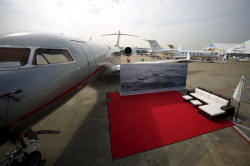|
Refurbs and rental planes
in vogue as China's jet-set seek value
 Send a link to a friend
Send a link to a friend
 [April 14, 2017]
By Brenda Goh [April 14, 2017]
By Brenda Goh
SHANGHAI
(Reuters) - China's rich are foregoing fancy new private jets in favor
of second-hand planes or rentals, reflecting how the country's business
elite are increasingly shunning flashy signs of wealth amid slower
economic growth.
Planemakers such as Embraer and Bombardier are shifting focus to
after-sales services in response, while brokers are refurbishing older
jets or hiring out planes as the once high-flying industry braces for
its weakest growth in a decade.
Dealers at one of Asia's top industry shows in Shanghai this week said
second-hand jets now made up more than half of sales to wealthy Chinese
entrepreneurs and corporations, up from under a third two years ago.
Chinese buyers, who began purchasing new business jets 30 years ago,
were also becoming more pragmatic about buying cheaper, second-hand jets
and giving them a makeover, they said.
"Now ... while you can still get a Gulfstream 550 for around $50 million
for a new one, you can get an extremely adequate aeroplane for $30
million," said David Dixon, president of business jet brokerage Jetcraft
Asia.

"So $20 million is a lot of money to anybody."
(For a graphic of the business aircraft market click http://fingfx.thomsonreuters.com/gfx/rngs/CHINA-JETS-BUSINESS/010040N31ES/business-jet-china.jpg)
In part the shift reflects a broader trend that is making life tougher
for firms selling luxury goods in the world's second biggest economy, as
Chinese buyers increasingly push for bargains on everything from
high-end handbags to holidays.
In such a market, where new planes quickly lose their value, dealers
said second-hand jets were simply a less risky bet.
"When the economic climate is going down, there's fewer buyers in the
market honestly, so the depreciation rate is higher," said Jackie Wu,
president of Hong Kong-based plane broker and charter firm JetSolution
Aviation Group.
She said a new jet typically lost around 15 percent of its value last
year, faster than the 10 percent loss in 2015.
"Now pre-owned aircraft are a better buy," she said.
"COLD WIND"
Greater China is the world's second-largest business jet market behind
the United States and had seen annual growth of up to 49 percent before
2012, when President Xi Jinping launched a fierce crackdown on
corruption that has discouraged conspicuous displays of wealth.
Owners include China's richest man, Wang Jianlin, who flies a Gulfstream
550, and Tencent founder Pony Ma who has a Bombardier Global 6000,
according to data compiled by Hurun Report which tracks China's
super-rich.
But growth has been slowing since 2012 and sales remain subdued. At the
Shanghai show there was a distinct lack of new orders announced, while
planemakers instead talked up their after-sales service.

Consultancy Asian Sky Group estimates the private jet fleet across
Greater China will grow just 1 percent this year - with a total of five
new plane deliveries - its weakest on record.
[to top of second column] |

A VistaJet aircraft is seen at the Asian Business Aviation
Conference and Exhibition (ABACE) at Hongqiao International Airport
in Shanghai, China, April 11, 2016. REUTERSAly Song/File Photo

There
are currently around 480 private jets in China, compared with 466 in 2015 and 67
in 2007.
"The entire market is now experiencing a cold wind," said Guan Dongyuan,
president of Embraer China.
Guan said, however, that the Brazilian planemaker was holding out for better
days, given the potential of a market that is still a long way behind the United
States, where there are around 12,000 private jets.
"We want to use the period when the market is relatively depressed to improve
our after-sales services," he said, referring to its spare parts and engineering
units.
Canadian rival Bombardier, which has 110 aircraft based in Greater China, last
Friday opened its first business jet service center in the country in the
coastal city of Tianjin.
GOVERNMENT SUPPORT
Executives said they were heartened by government signals to encourage growth of
the country's aviation industry, which remains hampered by a lack of
infrastructure and tight military control of China's airspace.
Last year, China said it would have more than 500 airports specifically for
business jets by 2020, and would further open up airspace for civilian use with
a view to grow the country's general aviation fleet to 5,000 aircraft by that
year.

"It's good that there's commitment, it takes time and we need to be patient,"
said Bjorn Naf, chief executive of Hong Kong-based jet management firm Metrojet,
who said competitors were still swarming into the market despite the headwinds.
"The market will swing back, I'm convinced."
Fang Xinyu, Beijing-based vice president of Deer Jet, which manages a fleet of
90 aircraft in China, said there had been a period of "depression" but that
business jets still made sense for busy company executives.
"The value general aviation provides in terms of time efficiency and privacy
have always been present," he said. "This is something no one can take away."
(Reporting by Brenda Goh; Editing by Alex Richardson)
[© 2017 Thomson Reuters. All rights
reserved.] Copyright 2017 Reuters. All rights reserved. This material may not be published,
broadcast, rewritten or redistributed. |